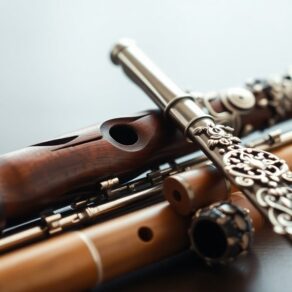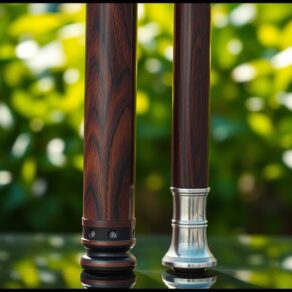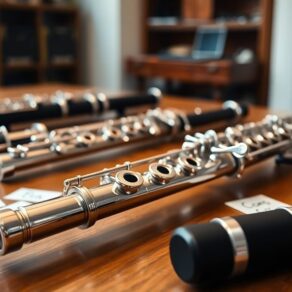When you're choosing a quality flute, consider seven key features. First, look at the material—silver, gold, or wood all affect tone. Second, examine the key mechanism type; the French system is agile, while the German system offers durability. Tone quality and projection are vital for sound clarity. Don't overlook pad quality; well-maintained pads guarantee effective sound production. The embouchure hole design impacts your comfort and playing style. Weight and balance contribute to how it feels during long sessions. Finally, consider the brand's reputation and warranty, which reflects quality and support. Discovering these elements enhances your flute selection process.
Key Takeaways
- Material Selection: Choose between silver for clarity, gold for warmth, or wood for unique timbre to match your playing style.
- Key Mechanism Type: Consider the French system for agility or the German system for a robust feel based on your comfort preference.
- Embouchure Hole Design: Select the right shape—oval for projection, round for warmth, or rectangular for brightness—to enhance your playing experience.
- Tone Quality and Projection: Look for flutes that produce a rich, full tone and can effectively fill a room for audience engagement.
- Pad Quality and Condition: Ensure high-quality pads are intact and well-aligned to prevent air leaks and maintain clear sound production.
Material and Construction
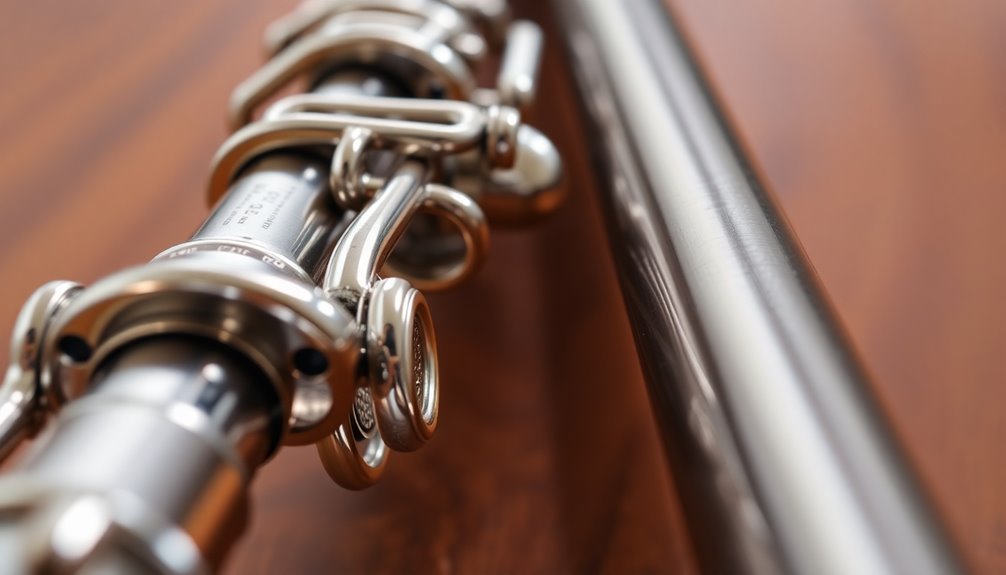
When it comes to choosing a quality flute, understanding the material and construction is essential. The flute's sound and playability largely depend on the material types used in its creation. Common materials include silver, gold, and even wood.
Silver flutes are popular for their bright, clear tone, making them a favorite among both beginners and professionals. Gold flutes, while more expensive, offer a warmer sound and richer tonal qualities. Wooden flutes, on the other hand, are cherished for their unique timbre and often appeal to those interested in traditional or folk music.
Construction techniques also play an important role in the flute's performance. For instance, the way the keys are assembled can affect responsiveness and ease of play. A well-constructed flute will have precisely aligned pads and a smooth mechanism, allowing for effortless changes between notes.
Look for flutes with soldered tone holes, as this technique enhances durability and improves sound quality, compared to those with glued tone holes. Additionally, ebony wood flutes are known for their premium craftsmanship and density, providing a warm, rich tone preferred by many musicians.
As you explore your options, remember that the right material and construction techniques can greatly influence your playing experience, helping you feel more connected to your instrument and the music you create.
Key Mechanism Type
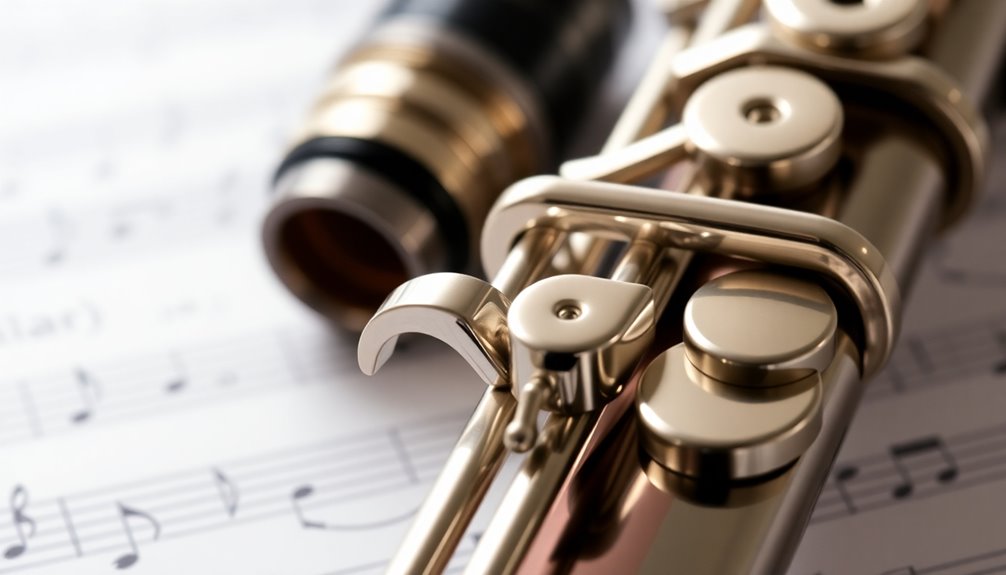
How do different key mechanism types impact your playing experience? When selecting a flute, understanding key mechanism types is essential as they can greatly influence your comfort and performance.
Common key mechanisms include the French and German systems. The French system boasts a streamlined design, offering quicker finger movement and facilitating complex passages. This can enhance your agility and responsiveness as you play. In contrast, the German system generally provides a more robust feel, which might suit those who prefer a heavier touch.
Each key mechanism type has its advantages. The French system often allows for easier maintenance, offering accessibility to the pads and springs, which can simplify repairs. Conversely, the German system's durability lends itself well to longevity, meaning you mightn't need to worry as much about frequent maintenance. Additionally, many professional flutes from brands like Yamaha are designed with user-friendly mechanisms that cater to a range of playing styles.
Choosing the right key mechanism also affects your overall sound production. A well-designed mechanism can improve your fingering efficiency, allowing for smoother shifts between notes. However, you'll need to take into account maintenance; regular upkeep is essential, especially with more intricate systems that may require specialized care.
Ultimately, your choice should resonate with your playing style and goals. Try various flutes to see which key mechanism feels most natural. By understanding the key mechanism advantages and how they align with your preferences, you'll feel more confident in your selection and your journey in music.
Tone Quality and Projection
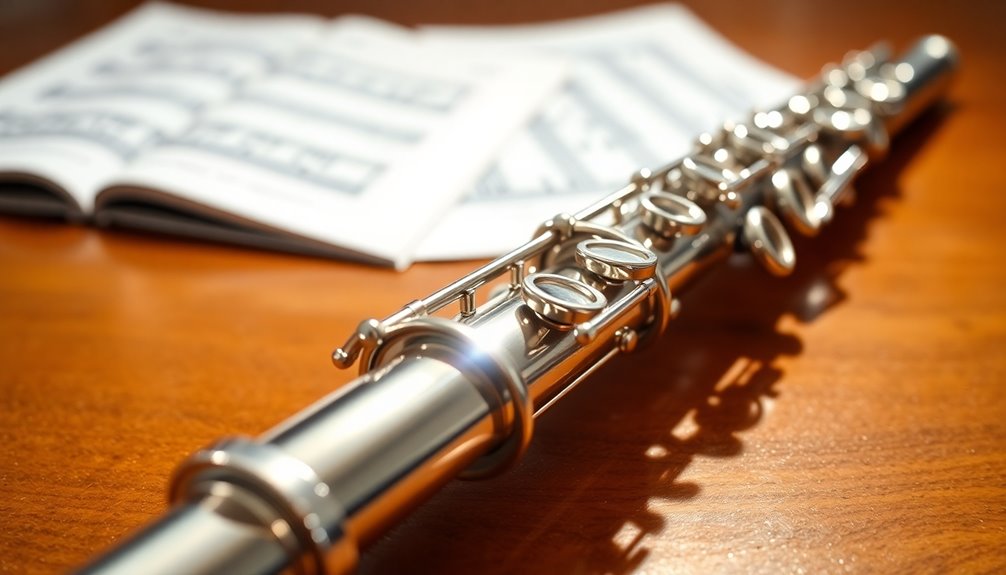
Tone quality and projection are essential elements that greatly impact your flute playing experience. When you select a flute, consider how these characteristics can enhance your performance and expressiveness.
Tone quality refers to the richness and clarity of sound your flute produces. A well-crafted flute should allow you to achieve a full, warm tone that resonates beautifully, engaging both you and your audience. Conducting a tone analysis while testing flutes can help you identify models that suit your personal sound preferences.
Sound projection is equally important; it determines how well your music carries in different settings. A flute with superior projection will allow your notes to fill a room, making it easier for listeners to appreciate your skill and artistry. When evaluating projection, pay attention to how the sound travels when you play at varying dynamics. A quality flute should maintain clarity and volume, whether you're performing softly or with powerful crescendos.
As you explore different flutes, listen carefully to the tonal differences and how they affect your playing. Engage with other musicians and seek feedback on your sound. Incorporating high-grade stainless steel in the construction of your flute can also enhance both tone quality and durability.
Strong tone quality and effective sound projection won't only elevate your performance but also foster a connection with your audience, making your playing more impactful. Ultimately, choosing a flute that excels in these areas will help you feel more confident and fulfilled in your musical journey.
Pad Quality and Condition
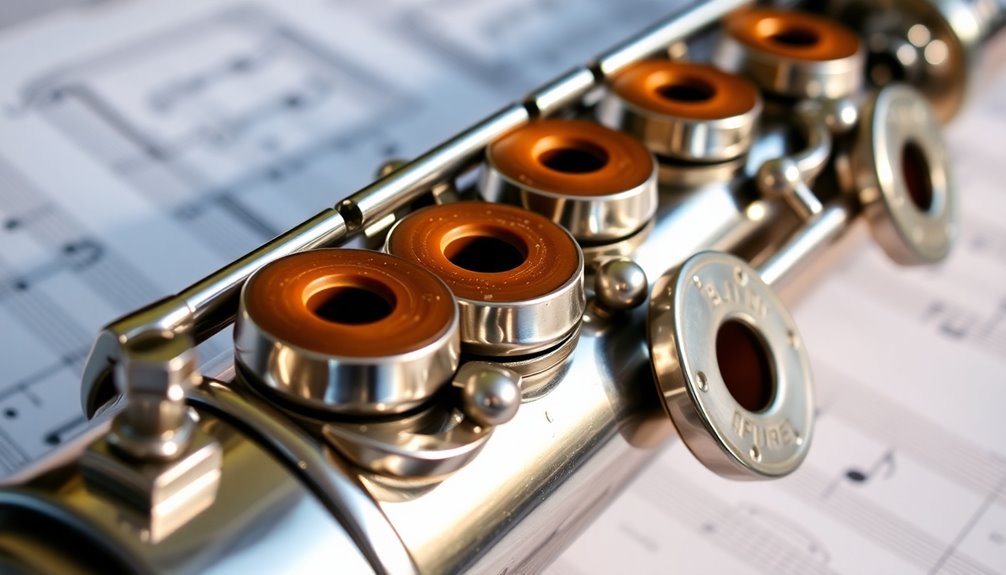
Your flute's sound quality and projection can only shine through if the instrument's pads are in good condition. Pads are essential components that create a seal over the tone holes, allowing for clear sound production. When evaluating a flute, pay close attention to pad durability.
High-quality pads are generally made from felt or cardboard, covered with a leather or synthetic material. They should feel firm yet slightly pliable, indicating they can withstand extensive use without degrading too quickly.
Additionally, you must consider pad alignment. Misaligned pads can lead to air leaks, resulting in fuzzy notes or diminished volume. When you play, check for any unevenness in how the pads seat against the tone holes. If you notice gaps or if some pads don't close completely, it's a sign that the flute may require adjustment or professional maintenance.
Inspecting the pads for signs of wear is also important. Look for cracks, discoloration, or visible indentations, as these can compromise their effectiveness. Regularly replacing pads is essential for maintaining optimal performance and ensuring that your flute produces the best sound quality possible.
Embouchure Hole Design
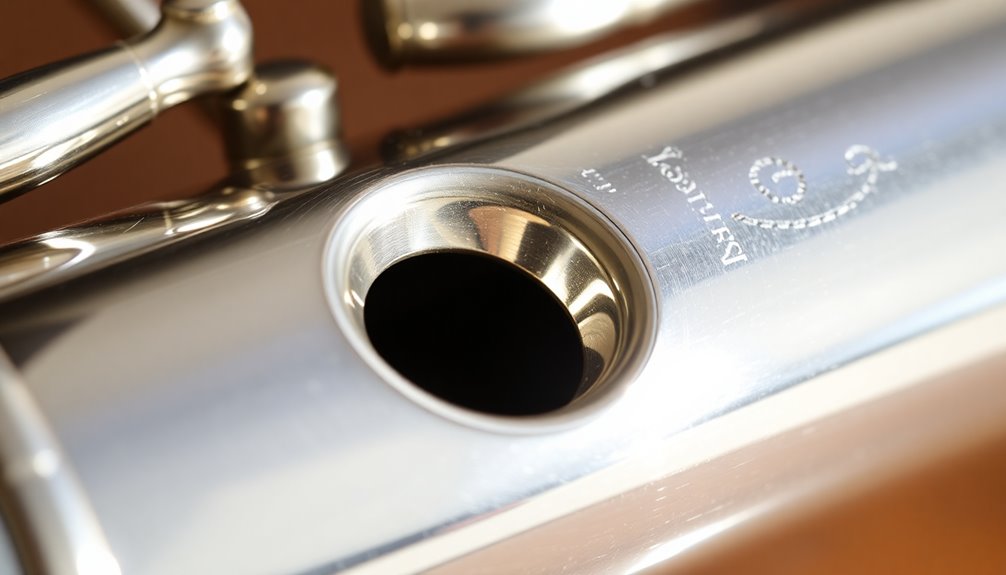
The design of the embouchure hole greatly influences your flute's playability and sound quality. The shape and size of this essential component can greatly impact your ability to produce a clear and resonant sound. As you explore different flutes, pay attention to how these factors contribute to sound emission and your overall experience.
Here's a quick reference table to help you visualize the variations in embouchure hole design:
| Embouchure Hole Shape | Impact on Sound Emission | Recommended For |
|---|---|---|
| Oval | Enhanced projection and clarity | Intermediate to advanced players |
| Round | Warmth and richness in tone | Beginners and casual players |
| Rectangular | Bright, focused sound | Solo performances and orchestras |
Understanding these shapes helps you grasp how the embouchure hole influences the airflow and, ultimately, the quality of sound you can produce. An oval hole often allows for a more centered sound, while a round hole can give a fuller tone. A rectangular hole, conversely, can create a more penetrating sound, suitable for performance settings where you need to cut through other instruments. Additionally, the choice of flute type can also affect how the embouchure hole interacts with your playing style.
When trying out different flutes, consider how each embouchure hole design feels to you. Finding the right fit not only enhances your technical skills but also fosters a deeper connection with your instrument, allowing you to express yourself fully.
Weight and Balance
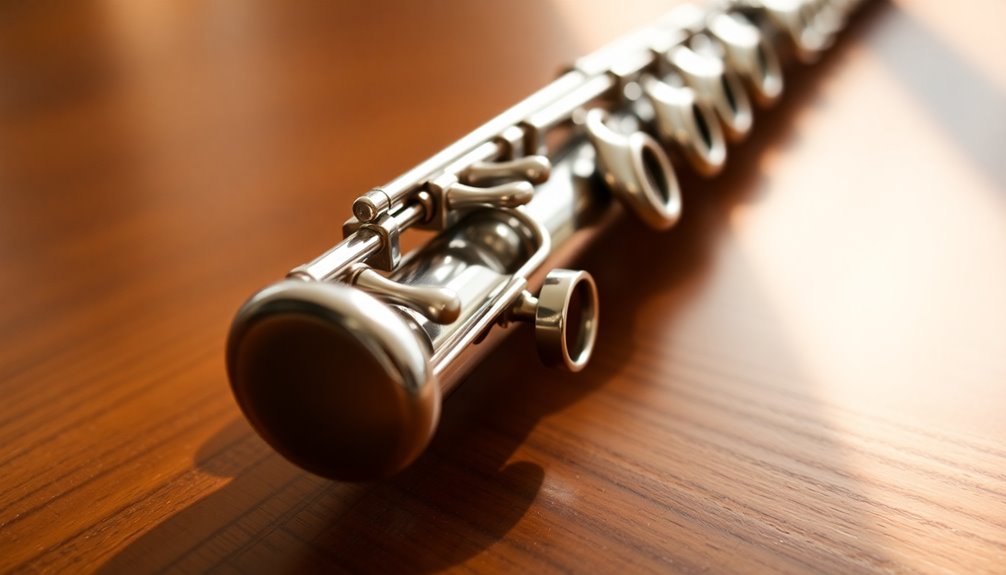
When selecting a flute, weight and balance play essential roles in your overall playing experience. The right weight distribution can greatly affect how comfortable you feel while playing, especially during long practice sessions or performances. A well-balanced flute should allow you to hold it effortlessly without straining your wrists or fingers.
You'll want to evaluate the flute's weight in conjunction with its ergonomic design. Flutes that are too heavy can lead to fatigue, whereas those that are too light might lack the resonance and sound quality you desire. Look for instruments that have a harmonious weight distribution, where the mass is evenly spread throughout the body. This balance enables you to maintain a natural posture, allowing for better breath support and finger agility.
When trying out different flutes, pay attention to how they feel in your hands. A flute with an ergonomic design will allow you to sit or stand comfortably without awkward angles. You should be able to shift between notes smoothly, without unnecessary tension. If you find yourself adjusting your grip frequently, the weight and balance may not be right for you.
Ultimately, investing time in finding a flute that complements your physical needs will enhance your playing experience. Remember, a well-designed flute isn't just about aesthetics; it's about creating a connection between you and the music you want to express. Additionally, proper sizing is crucial for preventing strain during prolonged playing sessions, which can further enhance your overall comfort and performance.
Brand Reputation and Warranty
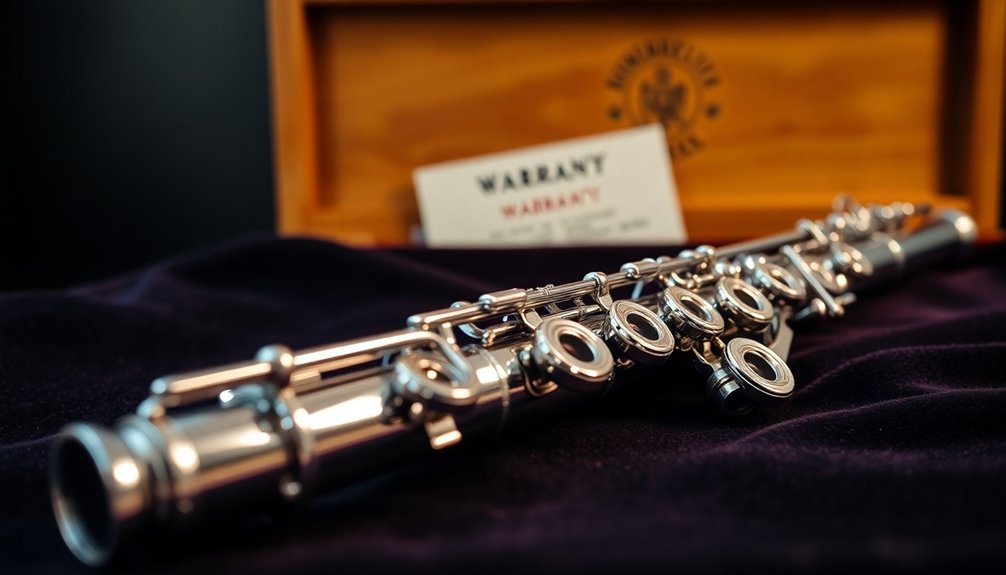
In the world of musical instruments, brand reputation and warranty can greatly influence your choice of flute. When you're investing in a flute, it's vital to reflect on the brand history. Established brands often have a track record of quality, craftsmanship, and reliability. They've built their reputation over the years, earning the trust of musicians at all levels.
Researching a brand's history can reveal how they respond to customer feedback and adapt their products, which is necessary for ensuring that you're purchasing an instrument that meets your needs.
Warranty coverage is another significant factor. A robust warranty indicates that the manufacturer stands behind their product, providing you with peace of mind. Look for brands that offer thorough coverage, which typically includes repairs or replacements for manufacturing defects. This can save you money and stress in the long run, especially as you navigate the learning curve of playing the flute.
When you choose a well-regarded brand with a solid warranty, you're not just buying a flute; you're joining a community of musicians who value quality and support. This sense of belonging can enhance your experience, as you connect with others who appreciate the same craftsmanship. Additionally, selecting a flute from a reputable brand like Yamaha, Pearl, or Gemeinhardt can ensure high-quality sound production and reliable performance.
Ultimately, investing time in understanding brand reputation and warranty coverage will empower you to make a choice that resonates with your musical journey and aspirations.
Frequently Asked Questions
How Often Should I Clean and Maintain My Flute?
You should clean and maintain your flute regularly to guarantee it stays in top shape. Establish a cleaning schedule after every practice session, wiping down the exterior and swabbing the inside.
Additionally, consider deeper maintenance, like checking pads and springs, every few months. This dedicated flute care not only prolongs your instrument's life but also enhances your playing experience.
A well-maintained flute makes a difference, allowing you to connect more deeply with your music.
What Is the Best Way to Store My Flute?
To store your flute properly, invest in a quality flute case that offers protection against physical damage.
Make certain to keep your flute in a temperature-controlled environment, avoiding extremes that could warp or damage the materials.
Regularly check the case for moisture and consider using silica gel packets to absorb humidity.
Can I Use Any Type of Cleaning Cloth for My Flute?
When it comes to cleaning your flute, think of it as dressing your instrument in its finest attire.
Not all cleaning materials shine equally! You shouldn't use just any cloth type; opt for microfiber or designated flute cloths that won't scratch or leave lint behind.
These choices guarantee your flute stays pristine, allowing it to sing beautifully each time you play.
How Do I Know if My Flute Needs Repairs?
To determine if your flute needs repairs, pay attention to flute symptoms like sticking keys, unusual sounds, or difficulty producing notes.
These repair signs indicate that something might be off. If you notice air leaks or a misaligned mechanism, it's time to consult a technician.
Regular maintenance helps guarantee your instrument stays in top shape, allowing you to fully enjoy playing and connect with others in your musical community.
What Is the Average Lifespan of a Quality Flute?
The average lifespan of a quality flute typically ranges from 10 to 30 years, depending on factors like materials and maintenance.
To guarantee your flute's longevity, regular cleaning and proper storage are essential. It's also wise to get it serviced annually.
Conclusion
When choosing a quality flute, it's crucial to take into account all the features discussed. Notably, about 80% of flute players report that the instrument's material greatly impacts their overall sound quality. This statistic highlights the importance of selecting a flute that not only feels right but also resonates well. By prioritizing these key features, you can guarantee you invest in an instrument that supports your musical journey and helps you express your unique sound with confidence.


